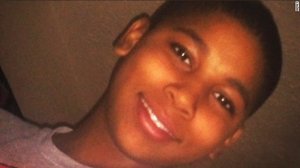4/26/2017

By Eric Levenson, Evan Simko-Bednarski and Joel Williams
CNN
(CNN) -- Two previously unseen video interviews with the police officers involved in 12-year-old Tamir Rice's death, recorded days after the shooting, provide new insight into their mindsets at the time. They also appear to be inconsistent with aspects of the officers' written testimony, an attorney for the Rice family said.
Timothy Loehmann and Frank Garmback gave the interviews to investigators a few days after Tamir's death on November 22, 2014. Cleveland.com first reported on the videos, which were provided to CNN by an attorney for the Rice family.
Loehmann, the officer who shot and killed Tamir, said in the video that he believed he saw a real gun and that he had to make a quick decision.
"The threat just became incredible, where I had to make the decision fast because Frank and I were in immediate danger," said Loehmann, an officer in training with Cleveland Police at the time.
"We were easy targets," he said. "Plus, I was stuck in the doorway, and my partner was still seated in the driver's seat, so we were basically sitting ducks."
Tamir was playing with a toy gun when a witness had called 911 to report that a person was brandishing a gun in a park, and noted that the person was "probably a juvenile" and that the gun was "probably a fake." However, that information was not relayed by the dispatcher to the responding officers.
Park video of the incident shows that Garmback, the driver of the vehicle, drove up to where Tamir was standing in the park. Loehmann shot him twice just seconds after exiting the car.
Loehmann and Garmback both said in written statements dated November 2015 they thought Tamir was pulling out a real gun. A grand jury declined to criminally charge the officers in 2015, although they do face administrative charges for possibly violating department rules.
Tamir's death sparked protests against police misconduct in Cleveland, becoming a rallying cry for the Black Lives Matter movement and a flashpoint in the national debate about race and policing. The city of Cleveland agreed to pay the Rice family $6 million to settle a wrongful death lawsuit last year.
'Inconsistencies'
At some points, the interviews are inconsistent with the written testimony the officers later provided to the grand jury.
For example, Loehmann says in the video interview that he opened the door of his police vehicle slightly when they were about 30 yards away from Tamir, while the car was still moving. Loehmann says that he loudly told Tamir to "freeze" and put his hands up.
However, Loehmann later wrote in statements to the grand jury that he started to open the door and yell at Tamir as the car slid to a stop.
In Loehmann's interview, authorities asked him if he had spoken with Garmback since the shooting to "rehearse" their statements.
"Um. Not -- Not really," he says. "We talked probably briefly about it, just making sure we were OK."
The attorney for Tamir's family, Subodh Chandra, pointed to the "inconsistencies" in the various statements.
"The inconsistencies among the officers' video-recorded statements, their prewritten and un-cross-examined statements to the grand jury, and the video of the shooting underscore how important it is for the city to finally hold these officers accountable," Chandra said.
"The Rice family hopes that city officials at long last comprehend that Clevelanders deserve far better than having these two incompetent individuals continue to carry guns and badges."
Emotional testimony
In his video interviews, Garmback says he prepped his rookie partner on what to expect for a "gun run."
"I tell him 'This is a gun run, what would you do in a gun run?' He starts, 'I'd get out of the car, I'd be in a certain stance,'" Garmback says. "I stopped him there and said, 'This is a gun run, be prepared for the worst-case scenario. Have the gun already unholstered on your lap.'"
Twice in the interview, Garmback breaks down in tears and becomes emotional. At one point, Garmback says he drove up to the park and spotted "the kid," who turned to face the police vehicle.
"At this time, I can hear Patrolman Loehmann yelling, 'Show me your hands, show me your hands, show me your hands!' I can see through here, the kid reaching, pulling--" Garmback says.
Garmback then abruptly stops talking, covering his face with his hands.
"I didn't know it was a kid," he says. "I could see him pulling the gun out of his waistband."
At another point, Garmback again becomes emotional when he explains how he was telling radio patrol to hurry to the scene.
"I get radio saying speed it up speed it up. And they don't," he says before stopping in tears. "I can see this kid's eyes rolling in the back of his head."
